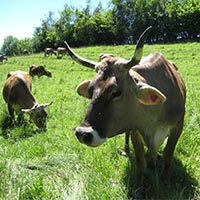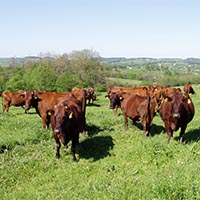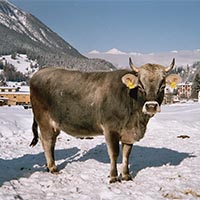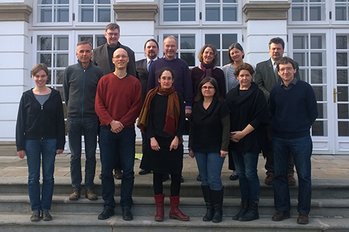ORGANICDAIRYHEALTH
Improving animal health and welfare in organic cattle milk production through breeding and management
Background
Pasture based systems often lead to better cow welfare. Nevertheless mastitis and metabolic diseases are major challenges. While local/native breeds produce less milk than modern breeds and therefore are less often used, they may be better adapted to local, especially organic conditions where farmers are more strongly depending on local fodder resources. However, we know very little about health status, medicine use and phenotypic functional characteristics of local/native breeds in organic dairy production in Europe.
Video about OrganicDairyHealth
This video was produced at the second project meeting held at the end of February 2016 at the Research Institute of Organic Agriculture FiBL in Frick.
Watch Anna Wallenbeck (Sweden), Ute Knierim (Germany) and Jan Tind Sørensen (Denmark) explain how they combine breeding and management measures to achieve this goal.
Main project activities
- Breeding strategies for organic dairy production in Europe will be enhanced by taking into account characteristics of commercial and local/native breeds and their ability to adapt to local environments including grazing and low concentrate feeding.
- Genomic selection and crossbreeding of local/native and commercial breeds are investigated for future organic dairy cow breeding.
- Risk factors for stress and udder infections will be identified
- Systematic use of drying off quarters with mild mastitis will be analysed.
- Efficient preventive and handling strategies will be developed, improving udder health and reducing medication in organic dairy herds without negative effects on animal welfare.
- Pasture based feeding strategies is developed for reducing metabolic disease and mastitis risks. This effect can be increased by utilizing information concerning individual cow activity.
Benefits and results
Expected societal benefits of the project
A major focus in the project is to reduce the application of medicines in organic livestock production and further to promote pasture based system for dairy production. This will increase societal thrust in organic milk. It is further expected that the project will increase the competitiveness of organic milk compared to conventional milk.
A critical investigation targeting at fitting local/native breeds into an organic concept will give opportunities for a desired cultural and environmental development promoting breeding diversity. It is ethically and societally critical that reduced medication and production under organic production conditions will not compromise animal welfare. Animal welfare is therefore critically assessed in the development of all management strategies.
Expected outcomes, results and impact
New site and farm type specific breeding strategies is developed and will provide long-term health improvement for the benefit of animal welfare and the competitiveness and societal trust in European organic dairy production. By introducing management procedures for improved resilience towards mastitis and a drug free mild mastitis handling procedure, we expect a significant reduction in antibiotics used in organic dairy production. This will lead to an immediate and significant reduction of medicine application in the organic livestock sector. The new management procedures will be developed in relation to real farm environments and will be accompanied by farm type specific economic consequence estimations.
The breed aspects of production and health at grazing and at relatively low concentrate level is further investigated through characterisation of productivity and health of local/native breeds with reference to commercial breeds in organic and low-input environments. Implementation of the results from the project will increase demand for organic milk production and thereby increase transition from conventional to organic production. Due to the dominant role of dairy cattle in European organic livestock production these opportunities will benefit the organic livestock sector in general.
Expected long-term impact
New breeding strategies taking into account the potentials of local/native breeds will provide long-term health improvement for the benefit of animal welfare and the competitiveness and societal trust in European organic dairy production.
How to reach target groups
Information from the database will be available for future research and networks. Results on traits will be discussed with farmers and associations during workshops. The involvement of organic dairy farmers in the studies is a route for immediate dissemination.
Project coordinator
- Jan Tind Sorensen,
Department of Animal Science, Aarhus University
Mail: jantind.sorensen@anis.au.dk




Project partners
Jan Tind Sorensen, Aarhus University Department of Animal Science Denmark
Christoph Winckler, BOKU Department of Sustainable Agricultural Systems Austria
Anna Wallenbeck, Swedish University of Agricultural Sciences, Department of Animal Breeding and Genetics. Sweden
Anet Spengler, FiBL Switzerland
Ute Knierim, The Farm Animal Behaviour and Husbandry Section of the Faculty of Agricultural Sciences, University of Kassel. Germany
Morten Kargo, Department of Molecular Biology and Genetics, Aarhus University. Denmark
Jacek Walczak, The National Research Institute of Animal Production. Poland
Vytautas Ribikauskas, Lithuanian University of Health Sciences, Veterinary Academy. Lithuania

ORGANICDAIRYHEALTH project participants taken at their kick off workshop in Balice Poland 22-24 February 2015.
The project ORGANICDAIRYHEALTH is funded by ERA-Net CORE Organic Plus Funding Bodies partners of the European Union’s FP7 research and innovation programme under the grant agreement No. 618107.
